
 Flash News
Flash News
The mystery of Renis Dobra's murder, the two main leads of the investigation are revealed
Rama's ultimatum: On Monday, all heads of administrative units must be dismissed
Fires in the country, 4 fires still active, what is the situation?
Rama targets Shkodra prosecutor again: Gjeli wrote philosophical essay with innocence of illegal construction
Wanted for theft, 26-year-old arrested in Durrës
"The pipes are empty"/ Europe is facing extreme water shortages, as the situation in different countries presents itself

The French government has set up a crisis team to tackle a historic drought that has left more than 100 communes without drinking water. Trucks are taking water to those areas, as "there is nothing left in the pipelines," said Minister for Ecological Transition Christophe Béchu.
"This is a situation like nothing we've ever seen... And the bad news is, as far as we can see, there's no reason to think it's going to stop."
Prime Minister Elisabeth Borne has warned that France is facing the "heaviest recession" ever recorded in the country.
The heat wave that has hit the country since June has caused the vegetation to wither, creating scenes that look like autumn. The French national meteorological service Météo-France is predicting a further rise in temperatures from Sunday onwards and even drier ground despite the recent storms.
In Rome, residents and tourists alike cooled off at the many water fountains located throughout the city. Popular tourist destinations such as Florence and Palermo are among 16 Italian cities on the "red alert" list, with temperatures reaching 40°C.
Rice production in the Po River Valley is under severe threat as drought and hot weather continue to cause fields to dry up completely.
Farmers say crops of rice used for risotto can be damaged for years by rising salt content in the soil, which is killing the plants.
Part of a 17 billion euro package of government measures to tackle Italy's cost of living crisis is also aimed at mitigating the effects of the country's worst drought in 70 years.
Last month, Italy's agriculture minister warned Parliament that a third of Italy's agricultural output was at risk due to drought and poor water infrastructure, and that the situation will only worsen in the coming years.
Ministri holandez i Infrastrukturës dhe Menaxhimit të Ujit, Mark Harbers u ka bërë thirrje njerëzve që të reduktojnë përdorimin e ujit. Holanda deklaroi të mërkurën një mungesë zyrtare të ujit, pasi tashmë ka vendosur kufizime në bujqësi dhe transportin detar.
Qeveria paralajmëroi se thatësira pritet të "vazhdojë për ca kohë" dhe masat e mëtejshme për të ruajtur ujin. Disa rajone të Holandës, eksportuesi i dytë më i madh bujqësor në botë pas Shteteve të Bashkuara, i kanë ndaluar tashmë fermerët të ujitin të korrat.
Nivelet e ujit në Rhine në Gjermani gjithashtu kanë vazhduar të bien në mot të nxehtë. Kostot e transportit janë rritur sepse anijet nuk mund të lundrojnë në lumë të ngarkuara plotësisht, thanë ndërmjetësit e anijeve të premten.
Transporti i mallrave në lumë vazhdon, por me anije ndonjëherë të detyruara të lundrojnë 75% bosh. Kapaciteti i transportit është tashmë i shtrënguar për shkak të rritjes së kërkesës pas lëvizjes së Gjermanisë për të rritur prodhimin e energjisë elektrike me qymyr, ndërsa ajo po përgatitet për furnizime të reduktuara me gaz nga Rusia.
Në Rumani, nivelet e ujit në Danub kanë rënë aq shumë sa ishujt rërë u shfaqën në rajonin e Kalafatit. Nivelet e Danubit tani janë afër nivelit të tyre më të ulët të të gjitha kohërave.
Qeveria planifikon të rrisë investimet në projektet e ujitjes për të kufizuar dëmtimin e të korrave në të ardhmen. Të mërkurën, Komisioni Evropian u bëri thirrje vendeve anëtare që të ripërdorin ujërat e zeza urbane të trajtuara për ujitje bujqësore.
Other parts of Europe have also experienced harsh early summer conditions. Portugal last month recorded its hottest July since records began in 1931, the country's weather service IPMA said on Friday.
The heat worsened Portugal's drought, with 45% of the continent in "extreme drought" - the highest classification - and the rest in "severe" drought, which is the second highest, by the end of July.
Source: Euronews
Latest news

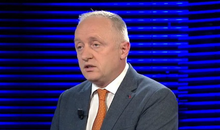
Dervish's Irony: Why are 30 advisors few for a water supply director?
2025-07-11 11:58:20

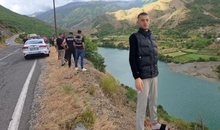
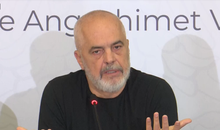
Rama's ultimatum: On Monday, all heads of administrative units must be dismissed
2025-07-11 11:05:59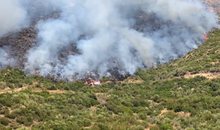
Fires in the country, 4 fires still active, what is the situation?
2025-07-11 10:56:23
Government irony: Rama strips Dredha of power, then demands law and order
2025-07-11 10:49:10
German media: Vlora Airport 'kills' one of Europe's largest wetlands!
2025-07-11 10:37:46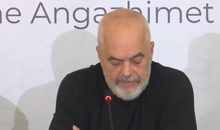
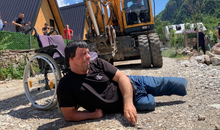
Amid the Alps in Theth, the law punishes even those who try to respect it
2025-07-11 10:14:16
Wanted for theft, 26-year-old arrested in Durrës
2025-07-11 10:03:29
After the dismissals, Rama gathers the mayors in Durrës
2025-07-11 09:42:29
Released on bail, Salianji appears before the Probation Service
2025-07-11 09:34:28

Haxhi Qamil Rama and the directors of the Municipalities!
2025-07-11 09:21:35
30 years since the Srebrenica massacre in Bosnia and Herzegovina
2025-07-11 09:10:52

From rhetoric to brandy, POLITICO: 9 things Nigel Farage can do in Albania
2025-07-11 08:53:35
Trump announces 35% tariffs on Canadian goods
2025-07-11 08:39:29
Foreign exchange, how much foreign currencies are sold and bought today
2025-07-11 08:24:25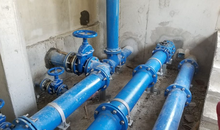

Horoscope, what do the stars have in store for you today?
2025-07-11 07:59:39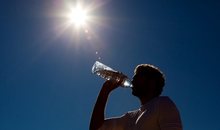
Sun and high temperatures, weather forecast
2025-07-11 07:41:09
Morning Post/ In 2 lines: What mattered yesterday in Albania
2025-07-11 07:20:14
Zhupa: In Theth, some Austrian strategic investors want the empty area
2025-07-10 22:57:08
Malltezi: SPAK admits, we are in a process that began with Balla's false report
2025-07-10 22:34:16

Si të çliroheni nga bllokimet emocionale me anë të ushtrimeve
2025-07-10 21:57:24

Lala: Veliaj wanted to return as mayor
2025-07-10 21:40:46

VIDEO/ Brawl in Bolivian parliament, deputies physically clash
2025-07-10 21:20:30


Albania experienced one of the longest heat waves of the last decade
2025-07-10 21:01:09

The Government approves new procedures for declaring residence in e-Albania
2025-07-10 20:39:32

Koka: Northerners will not forget Edi Rama's racist operation in Theth
2025-07-10 20:18:24
The 3 zodiac signs that will be most affected by the 'Full Moon' of July 10
2025-07-10 20:04:49
New director of the National Center of Cinematography appointed
2025-07-10 19:51:12
Korça/ 40-year-old man jumps from fifth floor balcony, in critical condition
2025-07-10 19:40:19
'Tired Woman'/ The Syndrome That Affects Thousands of Women Every Day
2025-07-10 19:34:02
Jane Birkin's original Hermès bag sells for $10 million
2025-07-10 19:26:22

Britain-Ukraine agreement signed for 5,000 Thales missiles
2025-07-10 19:00:25
Fire in Zvërnec, flames endanger two hotels
2025-07-10 18:57:19
Croatia restores compulsory military service
2025-07-10 18:39:01
Spahia: The great truth of the strong accusation of the residents of Theth
2025-07-10 18:35:07


The Supreme Court left him in prison, Meta addresses the 'Constitution'
2025-07-10 17:57:21
New punishment with 'new' regulations
2025-07-10 17:54:46
EU translator fired over fears for Zelenskyy's safety
2025-07-10 17:45:37
'You are a policeman, but not God, take my soul', protest for Agon Zejnullahu
2025-07-10 17:41:21


Video/ Rama repeats the scenario, kneels before Meloni again
2025-07-10 16:56:31
He set fire to a plot of olive trees, 50-year-old man arrested in Shijak
2025-07-10 16:46:19

Rubio: US and Russia have exchanged new ideas for Ukraine peace talks
2025-07-10 16:36:20
Death of 27-year-old, Lipjan Police Commander Resigns
2025-07-10 16:21:28
Video/ An apartment burns in Tirana near the New Bazaar
2025-07-10 16:09:36


Jensila lights up the internet with her birthday greetings to Ledri
2025-07-10 15:42:08
They're full of pesticides! List of 12 products we need to be careful of
2025-07-10 15:31:04

Worker falls from scaffolding in Shëngjin, urgently sent to Trauma
2025-07-10 15:11:03
Malltezi: Within one day they seized my accounts, properties and shares
2025-07-10 15:01:23
EU: Israel has agreed to more aid to Gaza
2025-07-10 14:55:19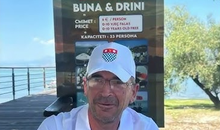

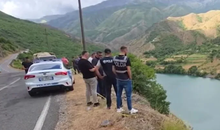
Murder of Reni Dobra, 23-year-old's vehicle pulled from the water
2025-07-10 14:29:23
Trump's tariffs on Brazil raise coffee prices
2025-07-10 14:16:07
Ursula von der Leyen survives no-confidence vote
2025-07-10 14:04:27

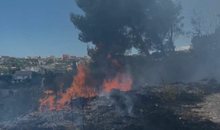
Fire in Lezha, flames near electrical substation
2025-07-10 13:32:24
Residents clash with police in Theth, a woman faints
2025-07-10 13:24:38
"Rama and Xanun"
2025-07-10 13:15:46

Zodiac signs most likely to get divorced in July 2025
2025-07-10 12:45:51
A scapegoat for an illegitimate Republic
2025-07-10 12:35:02
"He has devastated his own nation"/ Berisha: Rama imprisons his opponents!
2025-07-10 12:26:54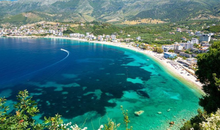

Albanian man injured with knife in Italy
2025-07-10 12:08:55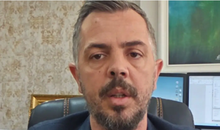






23-year-old in Mat drowned with rope, 4 suspects are being held
2025-07-10 10:58:53
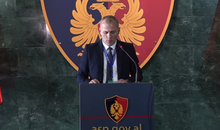
After the dismissals, the new director of the Shkodra Police is appointed
2025-07-10 10:30:10
BIRN: Rama's action for public spaces, a repeated spectacle
2025-07-10 10:29:11
Action in Theth, Shkodra Police leaders dismissed
2025-07-10 10:16:28
